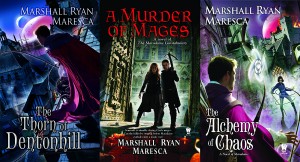Not to get all Goodfellas on you, but for as long as I can remember, I always wanted to be a genre writer.
It's funny, because the idea of writing sci-fi or fantasy has always been in me, long before I was really reading it. I have a hard time pointing to influences, because by the time I was seriously reading in the genre, I had a picture in my head of what I wanted it to be.
Of course, writing genre comes with a huge set of baggage.
I still remember in my college Creative Writing class the comments that started, "Well, this is fantasy, and fantasy is junk, but given that..." Even with Fantasy being more mainstream, it's still got a ways to go, at least in perception. Not too long ago, I read an article* which declared the genre "stale", though it was clear that the author only had the most cursory familiarity with the genre.
Fortunately, the baggage is not as heavy as it used to be. Sure, there will be a crowd that thinks it's not "real" writing, or "real" literature, or something, but I think the uphill battle for legitimacy has largely been won. The general public might not know the deep cuts in the SFF literature, but they they know that it's out there, and it's no longer in the darkened corner of shame of the Waldenbooks.
That is, if there were still a Waldenbooks, but that's a different story.
But it's not entirely gone. Just the other day I was introduced to a writer, and when I said I had three novels out and fourth coming soon, I got nods of approval... but once I described my books, I got that look.
I can take that look, though. Because I'm doing what I love. I'm doing what I've always wanted to do.
---
Only one week remaining to sign up for the ArmadilloCon Writers' Workshop! If you're in the Austin area-- or can get there with minimal trouble-- it's very worth your while.
---
*- I'm not going to link it, it does not deserve the traffic.












